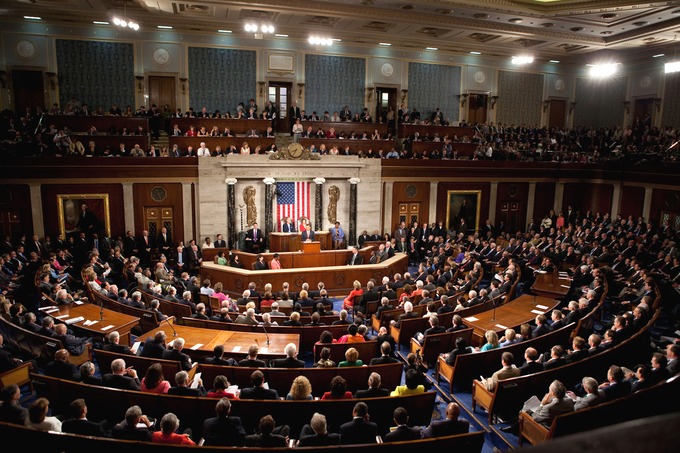
Don’t look now, but the democratic process is making a little comeback. On March 6, 2017, the Speaker of the House of Representatives proposed a structural bill to re-imagine health care in the United States. Almost immediately and uniformly, everybody found something wrong with it. And Ramparts couldn’t be happier.
The difficult, but ultimately elevating process of real legislative action under the influences of a functioning democracy is a wonder to behold. The United States Congress, that had abdicated its responsibilities over the last several decades in leaving bill philosophy and structure to the mercy of “experts” and regulators, and adjudicated budgets to the dustbin of history, suddenly finds itself awakening from a Van Winkle like sleep to find the country shocked by the November outcome in a much different place.
Ramparts railed against the damage being done to democratic vitality by the abdication of the legislative branch in 2011:
Madison recognized the legislative process as coming closest to mirroring the will of the people. As designed, representatives would review and vet the merits of the law in committee, debate and adjust it, assess its effects on the general good and its expenses to the general treasure, then representatively vote, so that a record would be available to the voting population to assure compliance with the will of the people in the next election, or adjust the legislature accordingly. The entire process commands that the people have a will, and that the will of the people is respected. Legislative branch has suffered most under the modern corruptions of lack of civics understanding, money of special interests, and general disinterest in the common good and importance of governmental restraint. In the past few decades, laws have achieved epic status, thousands of pages in depth, so that no serious vetting of their effect is feasible. Committees have given themselves up to poor attendance and lobbyist influence with legislators forming their opinion before reviewing a law’s consequences. The massive influx of money has made legislators progressively immune to the ballot box, and more willing to do the bidding of the interest that is supplying them with their re-election funding than for the voter citizen. The citizen has become ignorant of the importance of informed voting, and has accepted lax standards as to the sanctity of the vote, the propagation of numerous “democratic” votes to preserve non-democratic and self serving governmental mechanisms, and dis-interest in the outcome regardless of its effect on the society that has protected his rights for over 234 years. Ramparts – Can Our Democracy Survive Without A Legislative Branch? March 27, 2011
The so called American Health Care Act and following close behind it, a proposed Budget by the Executive that actually outlines priorities in a budget that balances the effect of the priorities, are like an enormous breath of fresh air to the process of democracy. For too long, the United States had simply functioned without a budget, operating on reconciliation bills, because no one had the courage to both list the nation’s priorities and attempt to fund them in relation to each other. The draconian sequester process forced ceilings on spendings regardless of priorities because there was simply no courage to do the hard work of arguing over relative value in a world of limited resources and determining that some might need pruning in order to invest in others more urgent. Committees met to determine the speed of growth of programs, not whether their existence any longer fit the current priorities of the nation. In the end, the every other year process of electing officials to do this work became only a relative break on the speed of governmental dominion, not the direction or value.
In similar fashion, the so called Affordable Care Act of 2010 was passed with members of the legislative branch voting for something they had never seen, recommended by leadership to vote for it so they could learn what was in it. ‘What was in it’ was a mechanism for the total re-write of American health care by bureaucratic regulators that would assure no interference with the inevitable investment of the government to assure every health decision be codified in an extra-legislative fashion. The bureaucracy grew 25% to assure this path became immutable. Within 6 years, the ‘expert’ bill fashioned by the elite, crashed upon the shoals of this very lack of vetting and revision the legislative process was designed to achieve through hard fought compromise. Some achievement. Some legacy.
Nobody likes the American Health Care Act, because this time its been proposed and immediately peppered with the many shades of interest a nation’s various constituencies empower in its elected officials. It will be diced, sliced and remodeled by these competing forces, and when it is done, it will be available for round after round of revision. Just the way its supposed to work. The budget and taxes will follow close behind, and in the end, the legislature will have realized that the founders wanted just this kind of discourse and national conversation, the kind that underlies a vibrant and healthy democracy.
It’s a shame that the Democrat Party stubbornly insists to remain on the sidelines, and only throw rocks at whatever is proposed and what ultimately passed. Rocks that are going to bounce off the ramparts of real democracy, ultimately to strike those who don’t participate in strengthening our future through real give and take.
Van Winkle. Our nation is starting to awaken.
